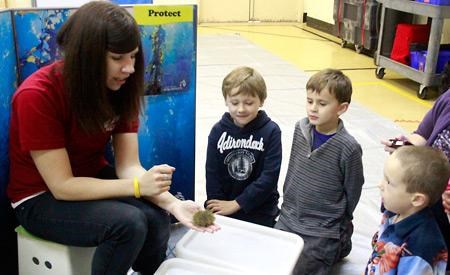Students at Henderson Elementary and Brooks Secondary schools discovered first-hand the connection between marine environments, aquatic animals and themselves last week when Vancouver Aquarium’s AquaVan rolled into town.
The AquaVan is a mobile aquarium which has been travelling around western Canada with its team of educators, stopping at schools and giving students the opportunity to interact with a variety of live sea animals.
“It’s mainly just to engage the kids with the animals and then inspire them to do something to save the planet,” said Lindsay Gibson, an AquaVan educator.
Sarah Evans, another member of the mobile aquarium’s educators, agrees. The hope is that through interaction with the sea animals students will become more aware of the need to protect and conserve aquatic environments, she said.
The animals in the mobile aquarium include sea urchins, sea anemones, crabs, sea snails and sea stars.
“These unique programs represent an important part of the aquarium’s mission to educate and inspire everyone to become responsible caretakers of the earth,” said Jonathan Hultquist, manager of curriculum programs at the aquarium.
Programs are tailored to the grade level of their audience, so elementary school students are introduced to live sea animals while high school students learn about classifying marine invertebrates.
“There’s a huge difference between what we’re doing with the older kids and the younger ones,” said Gibson. “With the young ones it’s talking about simple things like if you try to pull a sea star off a rock you could hurt it.”
Because the educators tailor their message, small groups attend each presentation to interact with the sea creatures.
“The Water Wonders program, for children in kindergarten to grade two, focuses on the impact litter has on animals and emphasizes how pollution reaches the ocean,” said Hultquist. “The grade eight to 12 programming focuses on intertidal marine biology using the kelp-urchin-otter food chain to educate young adults about how humans can have a large impact on many animals without even realizing it.”
The biggest challenge for the educators is trying to deliver the message that there is hope for the oceans if people want to do something about it.
“It’s difficult to make it sound like it’s not all doom and gloom,” said Gibson.
Evans said the educators hope students will want to help conserve and protect the animals after they learn about them.
Powell River was the last stop on the AquaVan’s tour of Vancouver Island and the Sunshine Coast before the van heads back to Vancouver for the winter.



